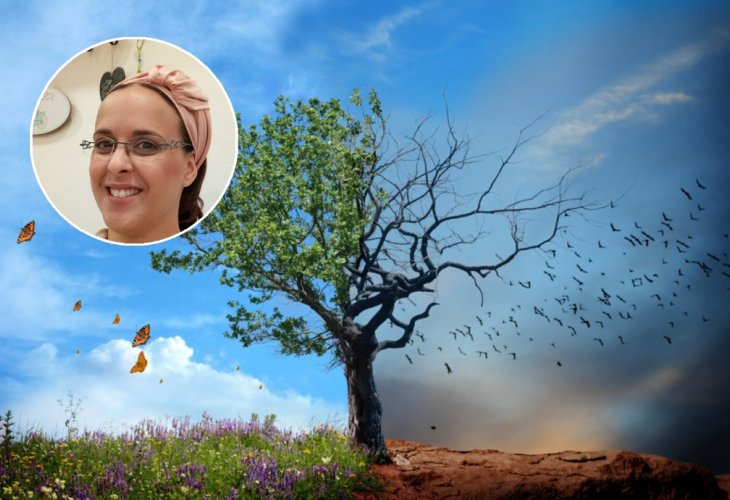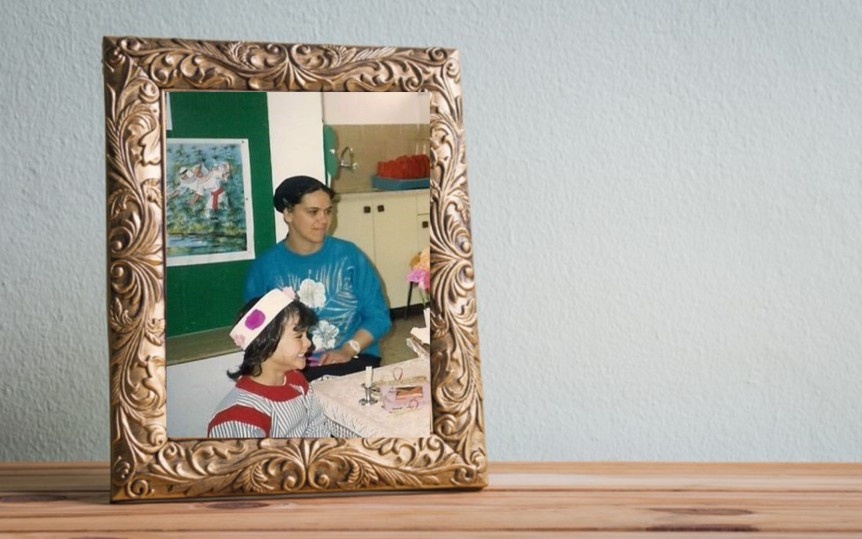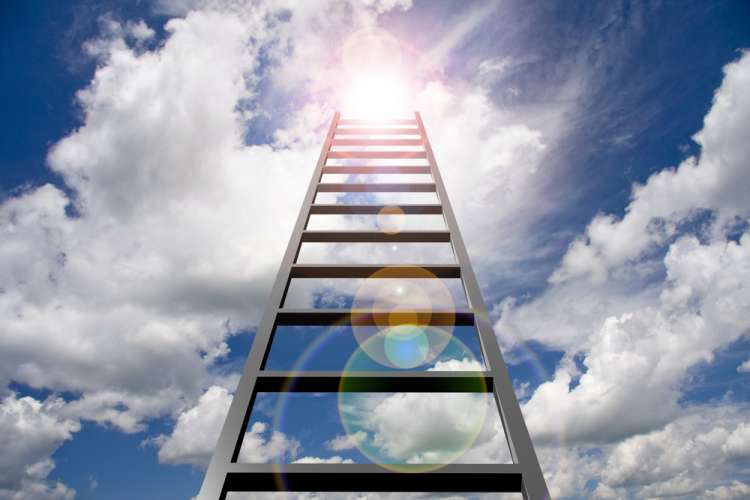Michal Hadari: "My Mother Was Killed in a Terror Attack, and at First, I Didn't Feel My Life Had Changed"
Michal Hadari's mother was killed in a terror attack when Michal was nine, and since then Michal lived her life seemingly normally until she encountered a crisis. In an emotional conversation, Michal shares about living in the shadow of orphanhood, her father who gave her strength, and the understanding that the choice for good is only ours.
 (Photo: shutterstock) Inset: Michal Hadari
(Photo: shutterstock) Inset: Michal HadariMichal Hadari exudes an aura of calm and acceptance; that's how I felt from the very first moment of our meeting. Her life wisdom flows from her, nourishing those ready to hear. And it's no wonder. This is wisdom acquired through extensive experience and tenacious coping that prevented her from giving up, even in the darkest moments of her life.
"My Mother Was Killed, But I Hardly Felt My Life Had Changed"
"I'm the fifth of seven children," Michal shares. "I was fortunate to grow up with a twin sister. While it was a privilege, it was also a challenge because comparison was always present between us. As a child, I lived with my family in the community settlement of Shilo. I was always a good student, gifted with a good mind, *Baruch Hashem*. I led the ordinary life of a regular child.
"In 1991, when I was nine, Yitzhak Shamir, who was the Prime Minister at the time, went to the Madrid Conference aimed at advancing the peace process between Israel, the Palestinians, and Arab countries. Following this, two buses of settlers left the settlement of Shilo for a demonstration in Tel Aviv against the conference. My mother and brother were on the second bus. When it reached the Tapuach Junction, it was ambushed by gunfire. The driver and my mother were killed, and seven children were injured. My brother, who was 11 at the time, wasn't physically hurt, but he saw everything. My older sisters were at the demonstration, while my twin sister, our younger sisters, and I were at home. That evening, two settlements were established: the settlement of Rehelim, founded by 'Women of Emunah' at the site of the attack, and the settlement 'Shvut Rachel' adjacent to Shilo, founded by yeshiva students from Shilo."
Michal recounts that the days of *shiva* were filled with much drama. "I remember my grandmother and aunt crying hysterically throughout the *shiva*. One day, my grandmother fainted, and an ambulance was called. The house was emotionally charged in a dramatic way. Since it was one of the first shooting attacks, there were many media people and many who came to comfort us. I wanted to reduce the drama, so I decided that no one would cry because of me. Out of this decision, I became a people pleaser. I innocently thought: 'I will always be okay.'"
You experienced a shocking trauma. How do you continue living from such a place?
"It might sound illogical, but apart from the emotional disconnection, we just continued living and going to school as usual. The community embraced us warmly; neighbors came to help us with homework, and girls from the service brought us food. But the truth is, as strange as it sounds, I didn't feel a real lack. Today, with a more mature and professional perspective, I understand it's called a 'defense mechanism.' As long as this mechanism didn't harm me, it was good that I didn't feel the lack, but as is the nature of a mechanism, the stage came when I began to be strongly affected."
 Michal Hadari and her mother, may her memory be a blessing
Michal Hadari and her mother, may her memory be a blessing
"Our Role in the World Is to Take Responsibility"
How did people around you react to what you went through?
"People often felt sorry for me and let me off easily. When I was in high school, I once had a teacher who wasn't aware of my situation, and she insisted that my mother come to a parents' meeting. I didn't want to embarrass her, so I said nothing, and she kept insisting until another student explained that it wasn't really possible. She cried and apologized. I simply felt embarrassed for her, but it didn't hurt me. I didn't cry for many years out of frustration because I hadn't processed the situation. I just repressed it."
Did repression help you? Did it make you not feel the lack?
"Yes," Michal surprises again. "I almost never felt the lack, mainly thanks to the fact that I have an amazing father who, with everything he had to deal with, provided us with everything we needed, both emotionally and physically. I lacked nothing. I was a 'by the book' child. Of course, I had small rebellions, but in general, I was a very good child. Only later did the crisis come."
Michal pauses for a moment. It is evident that she has reached the dramatic part of her life. She reflects for a moment and continues sharing: "I finished my studies and got married at 20. At 21, my firstborn son Lavie was born, and to be truthful, in a way, it was like 'playing house,' because apart from adjusting to the new situation, I didn't really understand what it meant to be a mother. I had an image of the perfect woman and mother in my head, and I tried to hold onto it. The one whose house is always clean, who never yells, who reads a story calmly to the children before bed. A fantasy that everything is always peaceful. When Lavie was two, Tehila was born, and that's when the crisis began. I couldn't meet the expectations of being the perfect woman, I had no patience for doing the dishes and laundry; the entire evening routine of dinner and baths was done in a state of stress, yelling, and frustration. I think this erupted after Tehila's birth for two reasons: firstly, because I suddenly understood I am a mother, and the second reason is that I had a daughter, and for the first time in my life, I dealt with a mother-daughter relationship, something I didn't know. Suddenly the feelings overwhelmed me, and I began to ponder everything I had been through. I thought to myself that if all these years I didn't really miss having a mother, then why is there even a need for a maternal figure, and in other words—why do I exist? I repressed the thoughts, and during that time, we moved to live on a kibbutz. A kibbutz is a disconnect from reality, just as I was disconnected. After three years, we moved to Kiryat Netafim near Ariel, and I began studying for a master's degree in family studies, knowing that this was important to me not just for a profession, but primarily for myself and my family. Of course, during the deep studies, I had to confront reality, and at some point, we were asked to prepare an assignment about ourselves. While writing that paper, it dawned on me that I don't know myself, because all my life, I was a people pleaser. I don't really know who I am and what I am. At first, I blamed everyone, especially the education system that let me off so much. Until one day, I spoke with a friend who told me a simple sentence: 'Our role in this world is to take responsibility.' Only then did it click for me, and I realized that I'm the one responsible for what I do. I started a process of getting to know myself, choosing my life anew. I let go of things that weren't right for me, and in some aspects, I continued to operate the same way, from my personal choice, and as surprising as it might sound, I even chose my faith anew."
 (Photo: shutterstock)
(Photo: shutterstock)What do you mean?
"I chose my religion anew, I chose to believe in *Hashem* not because I grew up this way, but because this is the essence. Without trying and thinking too much, I just felt *Hashem*. He's within me and everywhere. He supports and gives to me, and he's a good father.
"The process was difficult and complex, penetrating into myself, getting to know me - especially since I was nearly 30, a mother with five kids. I took every part, every essence of my life, and made a list of what's good and what's not, what's the ideal I expect to be, and what I truly want. I realized that what I imagined as perfect parenting isn't what I truly want. Because there can be dishes in the sink, and the laundry might not be folded, and I'll still be a good enough mother. I understood that I am a mother, and I have an important role. Everyone has to fulfill their role. A mother is a mother, and a child is a child. When I'm confident in my role and status as a mother, my children also have no doubt that I am a mother. There is no need to yell or stand my ground, it's clear. So is it in every field - as a daughter to my father, a wife to my husband, and a daughter of my Father in heaven."
What did you take away from this?
"I realized I want to learn how to empower children. Initially, I learned it for my children, to be a better mother. *Hashem* orchestrates things, and today I empower other children who come to me individually because they struggle socially or academically, so I help them boost their self-image. I think: 'Be the mother you didn't have.' I am there for the child, I give them what I needed in their place. I give them a hand, support, and accompany them, so they don't fall where I did. I strengthen them from within, so the reality won't be dramatic."
So you combined your studies of parental leadership with the field of empowering children?
"Exactly, and I've also developed an approach - parental leadership. The method teaches parents to operate from a calmer, stable, and confident place. It's a form of communication that occurs through body language that transmits energy because a child picks up the frequencies beyond words and body language. Part of the process is connecting to Chassidus, to Tanya, and to the Baal Shem Tov who speak about education in our lives, and I derive the knowledge from them. The entire process I went through became my calling."

